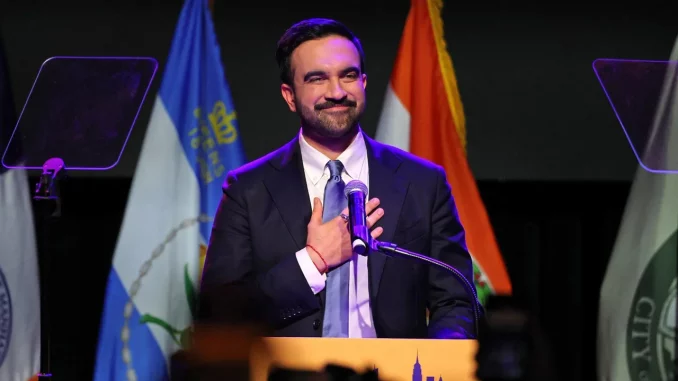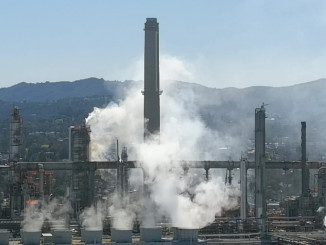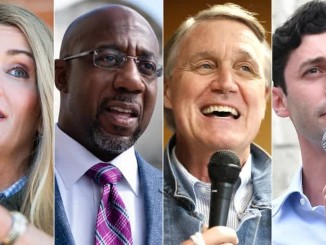
This past Tuesday, Election Day, Zohran Mamdani won the general election to become Mayor of New York City. He decisively defeated his chief rival, Andrew Cuomo, with 50% of the vote to Cuomo’s 41%. Much like his victory in the Democratic primary earlier this summer, this victory brought criticism and outrage from the right, and an electric sense of joy and hope for progressives. His decisive victory on Tuesday shows a number of important things.
His victory and the record levels of support he received show that millions are hungry for change, and specifically what they believe to be real change. As opposed to the lies and negativity of much political campaigning, people instead chose to support an incredibly positive and optimistic candidate. As opposed to the hatred, racism and sexism spewed by Trump and his reactionary supporters, people instead chose to support a message that everyone is respected and belongs. In that way, it showed that people would – when given the chance – much rather support something positive than give in to the messages of division, hatred and fear that characterize many political campaigns in the U.S.
More than one million chose to support a candidate who openly stated his desire to challenge the dominance of the billionaires who run our world, and who dominate New York City politics. They are sick and tired of the Trump’s, Bloomberg’s, Ackman’s, Lauder’s and other billionaires of the world getting richer on the backs of working people and making cities like New York unlivable for all but the wealthiest. This was an explicit rebuttal of all those people and their desire to keep things the same.
It also showed that money doesn’t always win. While that has generally been the case for decades in U.S. politics, this election made clear that even relatively small numbers of people, when well organized and working towards a common goal, can overcome concentrated wealth. A group of more than twenty New York based billionaires spent a total of at least $40 million try to defeat Mamdani. They spent that money to promote hysterical rants about how Mamdani would turn New York in to wasteland, how he was a communist, how he couldn’t govern, how he would enjoy another 9/11 attack, and on and on. Yet it couldn’t stop his positive message and the large electoral organization that he and tens of thousands of volunteers were able to build.
Mamdani was the first mayoral candidate since 1969 to win more than one million votes. He did so by bringing into politics in large numbers for the first time Muslim, East African and South Asian communities. He got total support from young progressives, politically left of center and squeezed by the nearly impossible rents and costs of living in the city. He energized progressive elements in the union movement. He even got many votes from districts where Trump and Republicans had previously done well in recent elections. Many Trump voters also are hungry for change, but have been misled and lied to about how that change will be achieved. Mamdani offered them another alternative, and at least some chose to vote for him.
He won those million plus votes by focusing on the real issues that affect people’s lives: the cost of rent and housing, the cost of groceries and the daily necessities of life, the costs of transportation, the costs of childcare. When you combine his focus on the real-world economic concerns of working people with his relentless positivity and message of inclusion and togetherness, it is easy to see why he garnered so much support. Hope for something better can and did mobilize people into action to support his campaign. It is a sign that when presented with better, more positive alternatives, many will choose that route.
But as we wrote early in October, Mamdani’s entire agenda still faces serious challenges. It is possible or even likely that he will be able to accomplish only a fraction of what he says he wants. The obstacles in front of him are immense, and he most likely will not be able to overcome them. Not, that is, without a larger movement with a class perspective.
As we concluded in October:
To accomplish his stated goals, there would need to be a real mobilization of working people that goes far beyond the electoral support and the support for modest reforms that he has assembled up to this point. What is needed is a real social movement, actively organizing to stop the rising reaction in the U.S. and to struggle for social progress on all fronts. It would take a social movement that doesn’t stop at the ballot box or support for politicians working within the system that constrains us. It would take a social movement that goes beyond single issues and single politicians and recognizes the interconnections between capitalism and most of the suffering that exists throughout our world. No one politician, no one political campaign, can substitute for an organized mass movement that can exercise real power in society.
In fact, as crucial as New York City is to the national and global economies, they are also essential to the well-being of the city and its residents. As big as the city is, it is not self-reliant. Its economy and its people are inseparable from the wider world. We are not going to solve our big problems in one city at a time. People in New York are at risk of climate catastrophe, nuclear war, and pandemics, like all people around the world. We need a politics that addresses all the crises we face.
The kind of social movement needed both in New York and the broader world would mean workers in workplaces organizing to stand up to their managers and bosses and corporate owners. It would mean organizing and striking to challenge the right of the capitalists to own and profit from the production of food, clothing and shelter that everyone needs. It would mean working-class people uniting across racial and ethnic lines, immigration status, and national boundaries. It would mean workers’ organizations forming defense committees and preparing to defend not only their members but all working-class people and the immigrant workers who work alongside them. It would mean entire working-class neighborhoods and maybe even whole towns and cities standing strong against raids and attacks on workers that are intended to divide us and intimidate us. It would mean mass marches on the streets of major cities but also organized mass resistance in smaller cities and towns throughout the U.S. and elsewhere. It would take strikes that start in a few industries but then spread to many more industries. It would take workers on a large scale withholding labor, bringing the system to a halt, and ending the generation of profit that drives the system and on which the capitalists depend.
No electoral campaign can do that, and no politician can do that. Particularly not in one city, surrounded inside and out by hostile forces. The most Zohran Mamdani and those like him can do is manage the suffering caused by the capitalist system in less painful ways or perhaps minimize the suffering that comes along with it.Zohran Mamdani’s campaign has reflected the pain and fear of millions of working-class New Yorkers with the conditions of their lives, as well as their frustration with business-as-usual politicians, whether Democrat or Republican. To have real hope for the future, we need to organize ourselves and not rely on politicians of the Democratic and Republican parties, no matter what they say or how well-meaning they may seem.




